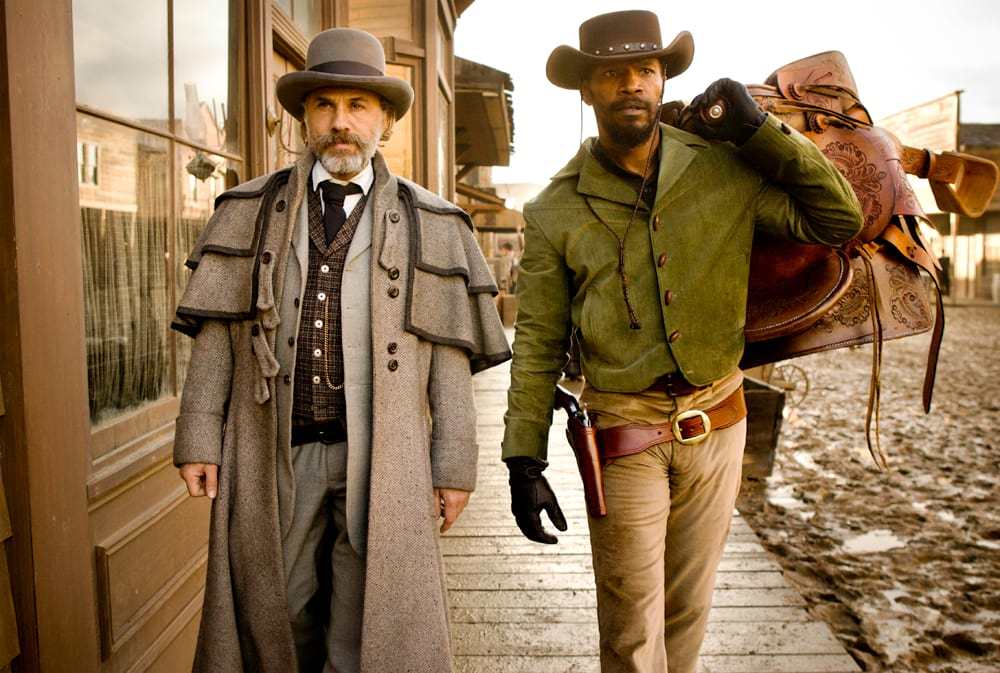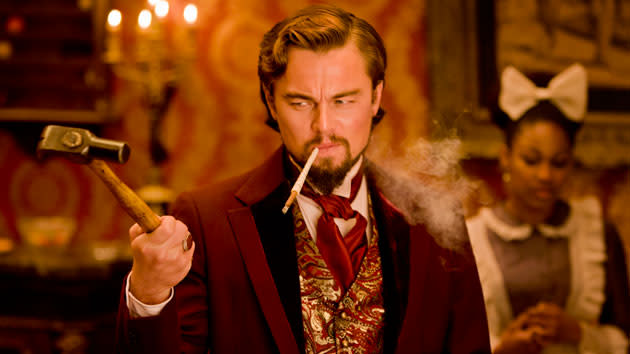Unraveling the Tale of "Django": A Cinematic Triumph

Plot Synopsis Set in the antebellum South amidst the brutal realities of slavery, "Django Unchained" follows the journey of Django (Jamie Foxx), a freed slave turned bounty hunter, and Dr. King Schultz (Christoph Waltz), a German-born dentist turned bounty hunter. Their unlikely partnership unfolds against the backdrop of pre-Civil War America, where Django seeks to rescue his wife, Broomhilda (Kerry Washington), from the clutches of Calvin Candie (Leonardo DiCaprio), a sadistic plantation owner.
Set in the antebellum South amidst the brutal realities of slavery, "Django Unchained" follows the journey of Django (Jamie Foxx), a freed slave turned bounty hunter, and Dr. King Schultz (Christoph Waltz), a German-born dentist turned bounty hunter. Their unlikely partnership unfolds against the backdrop of pre-Civil War America, where Django seeks to rescue his wife, Broomhilda (Kerry Washington), from the clutches of Calvin Candie (Leonardo DiCaprio), a sadistic plantation owner.
Driven by love and fueled by vengeance, Django and Schultz embark on a perilous quest that takes them from the sweltering cotton fields of Mississippi to the opulent halls of Candieland, Candie's sprawling plantation. Along the way, they encounter a cast of colorful characters, including the enigmatic slave tracker Stephen (Samuel L. Jackson) and the fiercely independent house slave Cora (Daniele Watts), each adding layers of complexity to the narrative tapestry.
As Django and Schultz navigate a treacherous world of deception, violence, and moral ambiguity, they confront questions of identity, agency, and redemption. Their pursuit of justice becomes a reckoning with the past, a confrontation with the horrors of slavery, and ultimately, a testament to the enduring human spirit.
Narrative Brilliance At its core, "Django Unchained" is a quintessential Tarantino film, characterized by its bold storytelling, nonlinear narrative structure, and stylized dialogue. Tarantino's masterful direction infuses every frame with tension, energy, and visceral intensity, drawing viewers into a world both familiar and alienating.
At its core, "Django Unchained" is a quintessential Tarantino film, characterized by its bold storytelling, nonlinear narrative structure, and stylized dialogue. Tarantino's masterful direction infuses every frame with tension, energy, and visceral intensity, drawing viewers into a world both familiar and alienating.
The film's narrative unfolds with a sense of urgency and momentum, propelled by a series of escalating conflicts and revelations. Tarantino skillfully weaves together multiple plot threads, shifting between past and present, action and introspection, to create a dynamic and immersive cinematic experience.
Central to the film's narrative is the evolution of Django as a character, from a victim of oppression to an agent of liberation. Jamie Foxx delivers a tour de force performance, imbuing Django with a potent mix of strength, vulnerability, and righteous fury. His journey from bondage to freedom is both harrowing and empowering, a testament to the resilience of the human spirit in the face of adversity. Equally captivating is Christoph Waltz's portrayal of Dr. King Schultz, a charismatic and enigmatic figure whose moral ambiguity adds depth and complexity to the story. Waltz's nuanced performance captures the essence of Schultz's internal conflict, as he grapples with his role as a bounty hunter, his sense of justice, and his growing bond with Django.
Equally captivating is Christoph Waltz's portrayal of Dr. King Schultz, a charismatic and enigmatic figure whose moral ambiguity adds depth and complexity to the story. Waltz's nuanced performance captures the essence of Schultz's internal conflict, as he grapples with his role as a bounty hunter, his sense of justice, and his growing bond with Django.
Leonardo DiCaprio delivers a chilling performance as Calvin Candie, portraying the character with a blend of charm, menace, and vulnerability. Candie represents the epitome of evil in the film, a symbol of the dehumanizing effects of power and privilege. DiCaprio's portrayal is both mesmerizing and repulsive, capturing the depravity of the antebellum South with unnerving precision.
Thematic Depth Beneath its surface of action and spectacle, "Django Unchained" grapples with profound themes of race, justice, and freedom. Tarantino uses the framework of a spaghetti western to explore issues of systemic oppression, racial injustice, and the legacy of slavery in America.
Beneath its surface of action and spectacle, "Django Unchained" grapples with profound themes of race, justice, and freedom. Tarantino uses the framework of a spaghetti western to explore issues of systemic oppression, racial injustice, and the legacy of slavery in America.
Central to the film's thematic exploration is the concept of agency, as characters navigate a world defined by power dynamics and social hierarchies. Django's quest for freedom becomes a metaphor for the struggle against oppression, as he asserts his autonomy and refuses to be defined by the chains of his past.
The film also interrogates the morality of violence, particularly in the context of revenge and retribution. Tarantino juxtaposes moments of brutal violence with moments of cathartic release, challenging viewers to confront the ethical implications of vengeance and justice.
At its core, "Django Unchained" is a story about the resilience of the human spirit in the face of adversity. Django's journey from slave to hero is a testament to the power of hope, courage, and perseverance in the face of overwhelming odds. His triumph over oppression is a victory not only for himself but for all those who dare to defy the status quo and fight for a better world.
Cinematic Craftsmanship From its breathtaking cinematography to its immersive sound design, "Django Unchained" is a triumph of cinematic craftsmanship. Tarantino's meticulous attention to detail is evident in every frame, from the lush landscapes of the Deep South to the gritty interiors of Candieland.
From its breathtaking cinematography to its immersive sound design, "Django Unchained" is a triumph of cinematic craftsmanship. Tarantino's meticulous attention to detail is evident in every frame, from the lush landscapes of the Deep South to the gritty interiors of Candieland.
The film's visual style pays homage to the spaghetti westerns of the 1960s, with sweeping vistas, intense close-ups, and dramatic camera angles. Tarantino employs a vibrant color palette, rich in earth tones and saturated hues, to evoke the harsh beauty of the American frontier.
The film's soundtrack, curated by Tarantino himself, is a eclectic mix of genres and styles, ranging from classic western scores to contemporary hip-hop tracks. The music enhances the film's emotional resonance and propels the narrative forward, creating a sense of urgency and immediacy.
" Django Unchained" also benefits from stellar performances by its ensemble cast, including supporting players such as Samuel L. Jackson, Kerry Washington, and Walton Goggins. Each actor brings depth and nuance to their respective roles, elevating the film beyond mere entertainment to become a timeless work of art.
Conclusion:max_bytes(150000):strip_icc()/django-unchained_510x3171-ce6caf24667e447ea8714c411b720d8b.jpg) In conclusion, "Django Unchained" stands as a testament to the power of cinema to provoke, inspire, and challenge our perceptions of the world. Quentin Tarantino's bold vision, coupled with stellar performances and meticulous craftsmanship, elevates the film to the realm of cinematic greatness.
In conclusion, "Django Unchained" stands as a testament to the power of cinema to provoke, inspire, and challenge our perceptions of the world. Quentin Tarantino's bold vision, coupled with stellar performances and meticulous craftsmanship, elevates the film to the realm of cinematic greatness.
Through its gripping narrative, thematic depth, and cinematic prowess, "Django Unchained" transcends the confines of genre to become a timeless meditation on the human condition. It is a film that resonates with audiences on a visceral and emotional level, sparking conversations and reflections that linger long after the credits roll.
As Django rides off into the sunset, his triumph serves as a reminder of the indomitable spirit of humanity in the face of injustice. "Django Unchained" is more than a movie; it is a cinematic triumph that continues to captivate and inspire audiences around the world.



















































